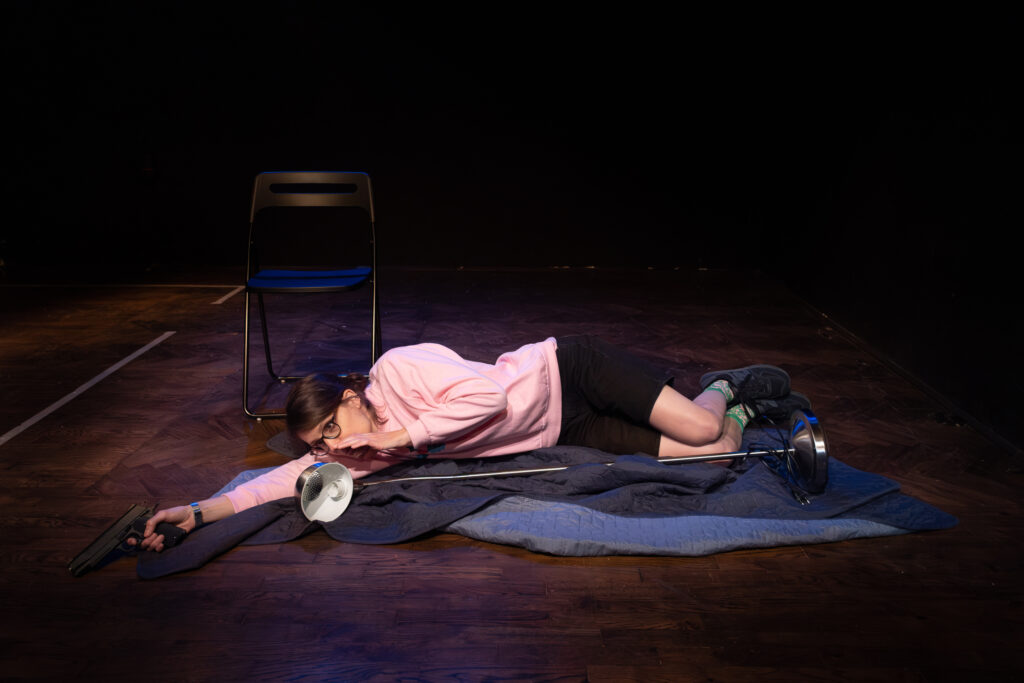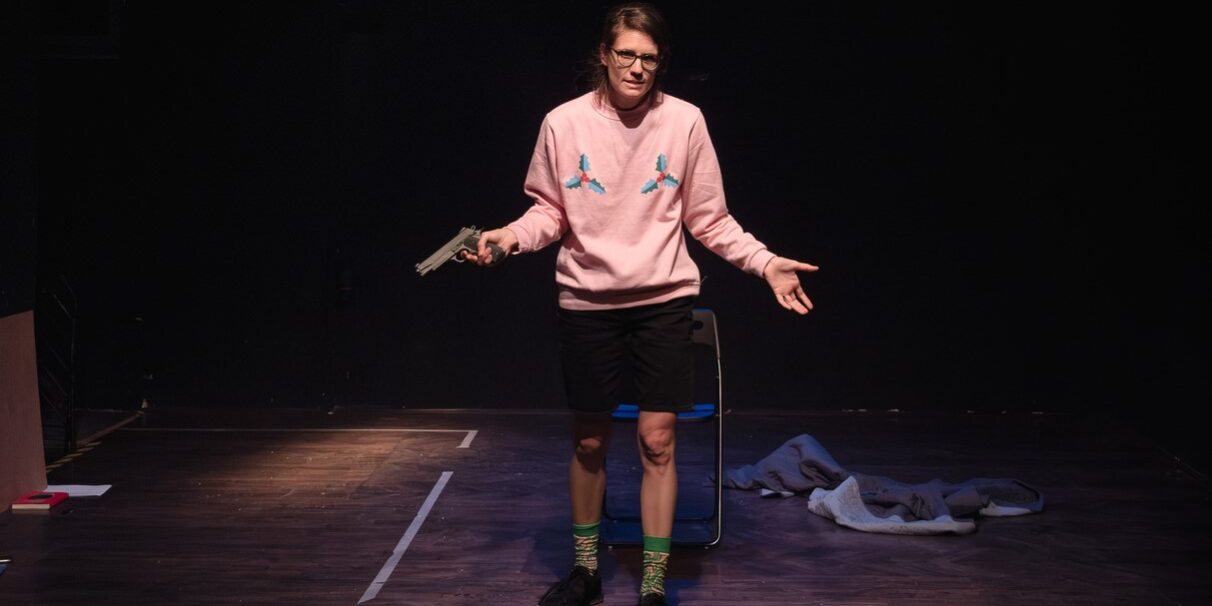KunstTeatar Zagreb, premiere 19th May 2022 (part of VoxFeminae festival)
‘Decency is just a petit-bourgeois wet dream. I know that no topic is inherently vulgar, only the way it’s written or talked about.‘
This is one of my favourite quotes from the Dirty words – essays on female sexuality (2020) written by Jasna Jasna Žmak, a Croatian dramaturg and author who also works as an assistant professor at the dramaturgy department at the Academy of Dramatic Arts in Zagreb.
In this book, she writes about her personal experience with internalised homophobia and misogyny, gender dysphoria and masturbation. These topics, with the addition of smashing the patriarchy and tinnitus, are covered in her new play this is my truth, tell me yours. In the play’s booklet, it’s stated that Žmak is the author and dramaturg but the performer is Jasna Jasna Žmak. That makes a funny and interesting distinction between the two. The question ‘which is which’; is single Jasna the private, should-be-taken seriously professor and double Jasna her free artistic persona – is irrelevant. Afterall, her name literally translates to English as ‘clear’, so it may just be a form of word-play.
‘The matter is very c l e a r to me.‘
This is Žmak’s debut performance as a performer – as a dramaturg she’s always stayed off and behind the stage. She addresses this right at the beginning of the performance when she enters the small Kunst stage walking backwards, not facing the audience and holding a gun. She refers to it as the Chekhov’s gun which in this occasion will not fire during the play. Nevertheless, the audience might expect that it will and still sit in fear, anticipating the sound of gunshot.
Žmak explains how nervous she feels being in the spotlight and plays with different methods of facing the audience: she tries taking of her glasses, covering her face with hands or hiding under a blanket resembling a ghost, explicitly referring to ‘hidden mother’ genre of photography and her work on the play We are Kings not Humans directed by Matija Ferlin.
In her work, she often uses games as her main dramaturgical concept, be it in language, dance or movement – it’s refreshing when theatre artists use child’s play as a part of their process as it usually results in pleasant surprises. The blanket will reappear during the performance and functions as a safe space for her when she talks about her struggles with sexuality and gender dysphoria – ‘Because of it, I often felt like a pancake.‘
Žmak even came up with the idea of performing in the dark while lighting up the auditorium instead but gave up on the idea since it wouldn’t be fair to make the audience a performer, when they have paid for the ticket to see her performing. After attempting different ways of facing the audience, none of which were ideal, she decides to pretend she’s giving a lecture, using her role of a professor to get over her anxiety and stage fright. This is a great example of Erwing Goffman’s ‘role theory’; in society people embody different roles that are assigned to them by others which come with their own rules of behaviour. Having found herself in the unknown, Žmak used the most useful known role she could, the teacher’s role, to better enrol in the performer’s part.
She’s very confident as a performer, her play works as a combination of monodrama and stand-up show and she manages to deliver both funny and serious tones throughout her performance. She’s very entertaining and funny, the humour comes from her awkwardness and honesty, mostly when she’s making meta comments on her play and performance. Gradually feeling more comfortable on the stage as time goes on, she even walks around the Kunst’s small auditorium and comments on the fear in the audience’s eyes because of the possibility of being asked to come on stage.
Žmak personally doesn’t have that fear – on the contrary, she loves it. However, in 2011 during the performance of MandićStroj in Zagreb, when asked by the Slovenian actor Marko Mandić to shoot him with the gun prop, the gun shot caused her to suffer from tinnitus and hyperacusis. She explains in detail how it happened, gives the audience a short description who the actor is and what he’s known for, plays a recording of her talking about the event which is actually a re-recording she made herself, as the original distributor of the recording, that is a part of a radio documentary, wanted to charge her a over-the-top high price for using the bit in which she’s talking.
Before playing it, she ‘accidentaly’ plays a sound of ringing, possibly giving the audience the taste of tinnitus. While playing the recordings of the event, she ominously holds the gun, pointing it to the stage or over the audience. The tension is high, keeping the audience in suspense of her possibly pulling the trigger.
‘I’m afraid… I’m afraid my tinnitus doesn’t get worse…‘
Žmak proceeds to explain how Mandić’s play is sexist, deploying the ‘Sexy lamp’ test – can your female character easily be replaced by a sexy lamp without the show falling apart – she re-enacts the scenes using a standing lamp, which is meant to replace the women that took part in Mandić’s play.
During this bit, Žmak stays calm but shows resentment and makes simple comments on how sexist the play is, which leads her to the topic of masturbation. Whenever male masturbation is mentioned, she acts it out and the only noise that can be heard is her wrist-watch dangling on her hand as she shakes it. I find this very amusing as the sound resembles the actual act. Male masturbation is very present in the media, even glorified as an art performance itself for which Žmak gives examples from art history, but female self-pleasuring and orgasm is far less well represented. She uses a moment in her play as a P(romotional) P(rogramme) to educate the audience on the female anatomy, specifically the clitoris whose size was wrongly considered to be smaller, only a dot, when in reality, it’s a full organ whose sole purpose is pleasure. the feeling of shame is one of her main motifs when she discusses sexuality and her struggles with coming to terms with her homosexuality and accepting her body.

This is my truth, tell me yours. Photo: Sanja Mercep
The open structure of her play allows her to not ‘kill-her-darling’ and she recites a monologue she assembled out of emails she’s written which include the words ‘tinnitus’ and ‘patriarchy’. She claims she’s done this to show how those two are connected, even though the first is a personal matter and the other is a social problem. The poem consists of those two words, with some alterations to them when they’re used in a sentence. She reads it very quickly, barely articulating, making pauses to express her true feelings of fear and worry for her medical condition which can also be applied to her thoughts on patriarchal society she lives in, ending the poem repeatedly reciting: ‘personal powerlessness, personal powerlessness, personal powerlessness..‘
For the final scene, Žmak at first wanted to bring Mandić on the stage ‘as a surprise‘ but decided not to and the actor agreed with her. The idea of this bit is that she would stand behind him and he would repeat the lines she’d whisper in his ear. This way, she’d be the one directing and speaking through him, emphasizing the hierarchy of the actor-director relationship where the latter usually has more power over the other. Instead, she stands on the stage alone and listens to the recording of her voice presumably via wireless earbuds.
Her speech is about the non-existence of freedom in the art, how artists aren’t held accountable for their works which can result in damaging consequences, intellectual and physical, as we can see from her example. The delivery of this part is very slow and unnatural as she makes pauses between words and sentences to better underline her final monologue.
By the way, one of the co-producers of ‘this is my truth, tell me yours‘ is Via Negativa, who also produced MandićStroj, the performance that changed Žmak’s life forever. She makes a comparison between her and Mandić, noticing that he never thinks about their encounter, while she thinks about it all the time. As she mentions in the booklet, the art really screwed her over and altered her life, however, she doesn’t put the blame on the actor(s), rather shifts to the ‘geniuses’ that care for nothing other than themselves and how brilliant they are. Žmak rightfully acknowledges the unfair power dynamic between actors and directors, how hard it must be to say no and to refuse to be put in the position one didn’t agree to. She strongly objects to the narcissistic image of the ‘genius’ artist who isn’t held accountable for the mistreatment towards their colleagues.
To end, I’ll leave you with a quote from Jasna’s book which is originally from The Argonauts by Maggie Nelson: ‘I told you I wanted to live in a world in which the antidote to shame is not honour, but honesty.‘
Credits: Author and dramaturg: Jasna Žmak//Performer: Jasna Jasna Žmak
Producers: Romana Brajša, Špela Trošt (Via Negativa), Barbara Zonta (Mesto žensk)
For tickets and more information, visit: KunstTeatar.hr
Further reading: Zagreb’s Kunst Teatar: “We want to attract new audiences to theatre.”
Nora Čulić Matošić (1998) is a student of Comparative Literature (MA) at the Faculty of Humanities and Social Sciences in Zagreb. She has written theatre criticism for the Croatian radio programme Theatralia and web portal Kulturpunkt.hr. Besides theatre, her interests are other forms of performing arts (particularly dance performances) and film.








